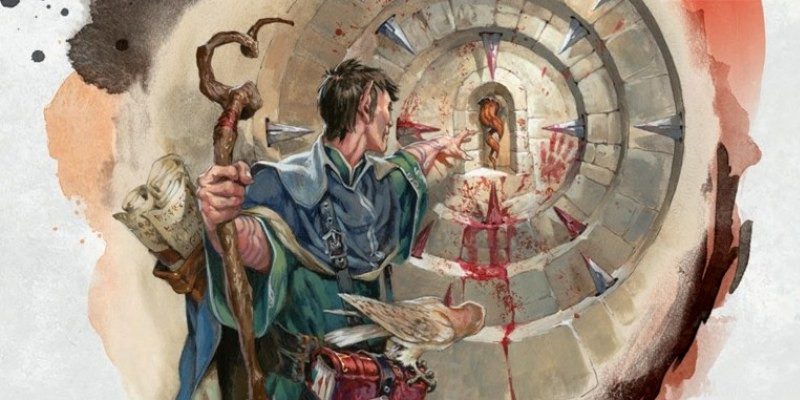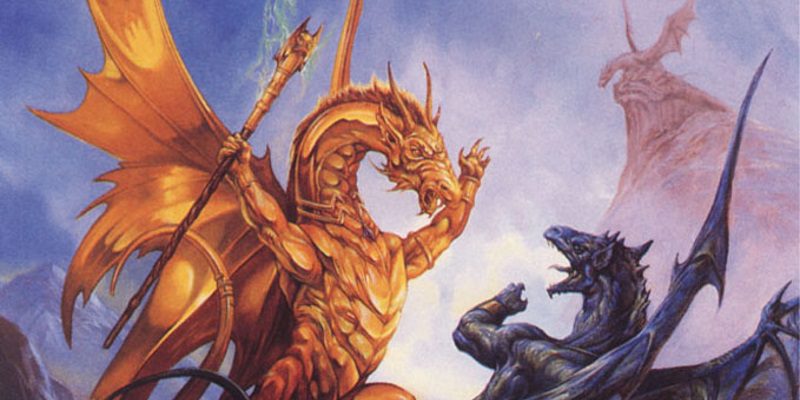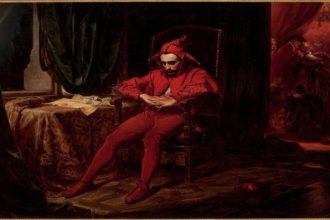A Writer’s Guide to Roleplaying: The Price of Magic, Part 1

Though I love Pathfinder for its crunchy goodness, the massive and almost incomprehensible number of magic items makes it hard to believe that magic is something rare and mysterious. Settings like Eberron embrace magic-as-technology, but I miss the days of magical mystery. Luckily, 5th edition has returned to the days of 1st and 2nd edition’s magic-as-rare mindset. A +1 dagger was something to be prized back in the day, and a cache of scrolls or potions were worth far more than gold. Yet the only consequences to RAW* magic items or spells are used spell slots, limitations on the number of items you can attune, and resting. None of which give a DM much fodder for storytelling.
All this reminds me of Sanderson’s Third Law of Magic Systems:
Expand what you already have before you add something new. A brilliant magic system for a book is less often one with a thousand different powers and abilities—and is more often a magic system with relatively few powers that the author has considered in depth.
It’s a common debate in fantasy-author circles: Do magic systems require rules, and consequences? Arguably, blockbuster authors like Tolkein and Rowling have systems of magic considered “light” on rules at best, and though I agree that magic systems aren’t required to have rules to be successful (see the award-winning, Hugo-nominated “The Hundred Thousand Kingdoms” by N.K. Jemisin), putting thought into how your system works can lead you to deep and interesting story elements you may not have considered.
But how does this apply to roleplaying games?
Magic in D&D has been light on consequence since its creation. Any magic item with a disadvantage attached is likely considered “cursed” and immediately discarded, especially in the days of “we’ll just make more”. For some, perhaps even most players and GMs, this lack of limitations is just fine. RPGs are meant to be heroic adventures full of action and excitement after all. For those creating their own campaign worlds, though, considering alternatives may lead you to adventure hooks and roleplaying opportunities that take your players to unexpected places.
A perfect example of this is J.M. Perkins’ “Home of the Hundred Saved“, where he takes the lowly and common (for adventurers anyway) ring of sustenance, and turns it into something horrifying and terrible, all without changing the mechanics of the item. As a horror-author, J.M. is practiced at digging deeper into what already exists and following where it takes him. He uses that same skill in his brilliant “The Adequate Commoner“, where he takes the NPC Commoner class for Pathfinder and uses its inherent limitations to create its strengths (which, incidentally, is Sanderson’s Second Law: Limitations > Powers). If you want to feel what it’s like to live in a fantasy world without superpowers, I can’t recommend AQ highly enough.
Since we can’t all be J.M., let’s start with generic mechanical changes for both spells and magic items. In Part 2 I’ll explore both roleplaying and mechanical consequences for specific magic items in 5e.
These options can be used in High Fantasy games, but are targeted at Low Fantasy settings like Scott Lynch’s “Lies of Locke Lamora” or Cthulhu-style horror where magic has potentially dire consequences.
Exhaustion
The exhaustion system in 5e is one of the few systems more complex in 5e than 3.*/PF. Exhaustion now has 6 levels that allows the DM to build tension and stagger (no pun intended) the consequences of environmental hazards and over-exertion. I used exhaustion as a consequence when creating the irezumi-alchemist tattoo magic, allowing a PC class to grant other party members magical abilities at a cost. You can use a similar system to varying degrees when considering magic items and spells in your game.
For any of the options below you can either use the existing Exhaustion chart, or use the expanded version below to grant more leeway to your PCs. The side-effects of exhaustion take longer to obtain with this option, but recovery time also doubles. I would let PCs make DC 15 Medicine checks to allow a patient to recover 2 levels of exhaustion per long rest to compensate. This has the added benefit of granting the terrible RAW* Medicine skill some use.
1-2 = Ability Checks
3-4 = Speed 1/2
5-6 = Attacks/Saves
7-8 = HP
9 = Speed 0
10 = Death
Spellcasting Consequences
There are several options for adding consequences to the spell casting in your world. I’ve listed them below by severity.
- Mild-Moderate Consequences: Whenever a caster expends all of their highest level spell slots, they gain levels of exhaustion equal to half that spell level (rounded down). 1st and 2nd level spell users can cast their spells with no problems, but a 17th level caster using their 9th level slot must make sure gaining 4 levels of exhaustion is worth the cost.
- Moderate-Severe Consequences: Whenever a caster expends their last spell slot of any spell level, they gain levels of exhaustion equal to Spell Level – their Spellcasting Ability Score Modifier.If a wizard with a 20 Intelligence expends their 9th level spell slot, they would take 4 levels of exhaustion. Spells up to 5th level for that caster could be cast easily and without issues. This puts significant decision-making challenges on higher level spellcasters, while allowing lower-level casters to enjoy spellcasting until their building power exceeds their mental capabilities.
Note: Proficiency modifier could be substituted for ability score modifier in the above formula to make the cost more uniform and predictable. Consequences won’t kick in until a full caster reaches 7th level (4th level spells), and 9th level spells will max out at 3 levels of exhaustion instead of 4.
- Moderate-Severe Consequences: Whenever a caster casts any spell, they must make a caster ability saving throw against a DC of 8 + the spell’s level or gain 1 level of exhaustion. This option is roll-heavy, potentially brutal, and though it makes every spell choice dramatic, it weighs the game down with rolls. Use cautiously with the RAW* exhaustion chart.
- Severe Consequences: Whenever a caster expends their last spell slot of any spell level, they must make a caster-ability saving throw against a DC 8 + spell level or gain levels of exhaustion equal to half the spell level (rounded down). This option affects all but the lowest level casters and can severely limit higher level casters. Casting all 6th and 7th level slots can potentially kill a caster without preparation or assistance (see below).
Spell Point Variant
If you are using the Spell Point variant from the DMG, things become a bit easier. Casters gain 1 level of exhaustion each time the expend 1/4, 1/3, or 1/2 their spell points (rounded down) depending on how difficult you want your magic system to be.
Moderating Exhaustion Loss
Anyone using a tool that causes exhaustion and even death will work on ways to make the job easier. Nothing should stop all consequences if you want them to be a part of your game, but below are a few options PCs can pursue as quest goals or that create possible plot points for the DM.
Caster Foci
A caster using a divine or arcane focus may be granted advantage on saving throws against exhaustion, or have exhaustion levels reduced by 1 automatically depending on what option you’re using. This option allows a DM to arrest PC casters, leave them stranded after a shipwreck, or dump them in a gladiator pit sans equipment, without completely removing their utility.
Magic Items
Instead of granting extra benefits to easily-obtainable divine and arcane foci, you could instead tie your spellcasting system to your magic item system. In Robert Jordan’s “Wheel of Time”, ter’angreal, sa’angreal, and angreal are items that either perform specific magical functions or act as a buffer for spellcasters when drawing more One Power than normally allowed. Items like this could reduce exhaustion for specific spells (option 3 above), spell levels (options 1, 2, & 4), or for all spells generally.
- Uncommon: This item reduces the exhaustion cost to 0 for a specific spell up to level 2. For example, a cure wounds item allows a caster to cast cure wounds using a 2nd level spell slot without accruing exhaustion.
- Rare: This item reduces the exhaustion cost by 1 for spell levels up to 2 or 3 (chosen by DM when created), or to 0 for a specific 3rd or 4th level spell.
- Very Rare: This item reduces the exhaustion cost by 1 for spell levels up to levels 4, 5, or 6 (chosen by DM when created), or to 0 for a specific 5th or 6th level spell.
- Legendary: This item reduces the exhaustion cost for all spell levels by 1, or to 0 for a specific 7th, 8th, or 9th level spell.
Ritual Preparation
Spells cast as rituals don’t expend spell slots, so can be used without the concern for exhaustion. Proper preparation is the key. You might expand the list of ritual spells to include non-combat spells used with creativity (such as dominate beast used on an animal in a cage or dominate person used on a captive being brainwashed over time, but not lightning bolt).
Help Action
The Help Action used by one caster to assist another could have of the following effects:
- The primary caster gains advantage on any saving throws against exhaustion caused by the casting of a spell (from option 3 or 4 above).
- The exhaustion levels accrued from casting are split evenly between the main caster an any casters using the Help Action.
- Both 1 and 2.
Digging deeper into Option 2 suggests some intriguing possibilities.
- Do the “Helpers” have to be voluntary, or can an evil caster dump 1 or more levels on sacrificial captives? This can lead to PCs needing to rescue captives before they are killed by excess exhaustion. Exhaustion is only recovered after a long rest if the NPC has access to adequate food and drink.
- Do all levels of exhaustion need to be applied if there are more helpers than levels to assign? For example, if a 9th level spell is cast and there are 5 total casters (1 main and 4 helpers), is there enough help to negate any exhaustion, or do a few helpers take the hit for the others?
Magic Item Consequences
Magic items can be handled in several different ways using the exhaustion system. These apply only to magic items that require attunement.
- After spending a short rest to attune a magic item, the user suffers 1 level of exhaustion.
- After spending a short rest to attune a magic item, the user suffers 1 level of exhaustion per rarity level above Common (1 for uncommon, 4 for legendary).
- After spending a short rest to attune a magic item, the user suffers 1 level of exhaustion per item they have attuned (1 for the 1st item, 3 for the 3rd).
Option 1 adds consequence to players looking to swap out items multiple times during a single day.
Option 2 adds roleplaying options to players looking to attune powerful items. This effectively increases the time required to attune powerful items. A very rare or legendary item will require the user to spend several days recovering, ideally spending that time truly understanding the item they’ve acquired.
Option 3 forces players to choose between taking a hit to immediately use an item they have found, or take the item out of an adventure for use later.
Other Thoughts on Systems of Magic
Mette Ivie Harrison‘s 12 Questions to ask when creating a magic system, expanded from Holly Black‘s fantastic talk on magic systems.
1. How is it learned and executed?
2. How is it accessed?
3. Does it have a will of its own?
4. Is it restricted in space and time?
5. What does available magic do?
6. How does it relate to the character, plot and theme of the book?
7. What is the cost of magic?
8. What can it not do?
9. How long does it last?
10. Who can use it?
11. How do others react to it?
12. Why haven’t people with this power taken over the world?
* = Rules as Written



